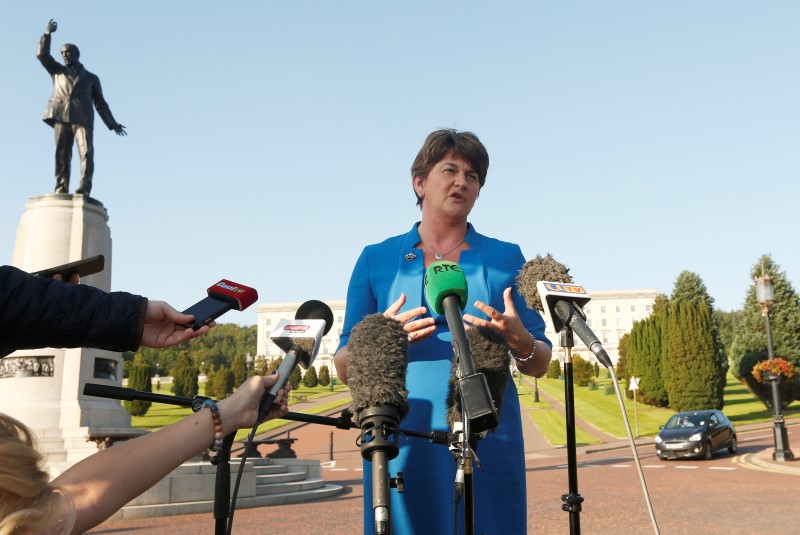By Ian Graham
BELFAST (Reuters) - A British exit from the European Union would not wreck Northern Ireland's economy, the minister widely expected to be named the province's next leader said on Monday, urging London to be bolder in its renegotiation with Brussels.
Britain's plans for a referendum on whether to stay a member of the EU has raised alarm in the Irish Republic over the political and economic implications and among Catholic Irish nationalists in Northern Ireland long opposed to British rule there.
According to an Open University report, a British exit from the EU would deprive Northern Ireland, one of Britain's poorest regions, of 8.4 percent of economic output that relies on direct EU funding. An Irish think tank said British-Irish trade would decline by 20 percent, with towns on either side of the border with Northern Ireland hit hardest.
However, Finance Minister Arlene Foster of the euro-sceptic Democratic Unionist Part (DUP), favored to replace outgoing First Minister Peter Robinson, dismissed fears that Northern Ireland's economy would be hit hardest by a so-called "Brexit".
"The idea that if we leave Europe that we wreck the economy is scaremongering. I think we would want to make sure we had free trade agreements with a lot of other countries, but we can stand on our own feet," Foster told Reuters in an interview.
"Do I believe it (the EU) needs reform? Absolutely. It is no secret that we are a eurosceptic (party) - I think we would like him (British Prime Minister David Cameron) to be a little more ambitious (in negotiations)."
Northern Ireland's largest nationalist party Sinn Fein - which shares power with the DUP - opposes a Brexit and warns of the possible impact on a 1998 peace agreement that ended decades of bloodshed between pro-Irish Catholic nationalists seeking union with Ireland and pro-British Protestants.
Foster said her party would wait to see what Cameron's EU renegotiation delivers before coming to a position.
Foster, 45, who has twice stood in as first minister over the past five years, said the party was "not at that stage" when asked if she would like to succeed Robinson after he announced on Friday that he would shortly stand down.
She said the DUP would first decide on a new leader - which Robinson indicated will be split off from the post of First Minister - and that the new leader would then pick who would be the new first minister.
DUP Deputy Leader Nigel Dodds, an MP in the British parliament, is the bookmakers favorite to become party chief.
While the DUP and Sinn Fein struck a deal last week to stop the power-sharing administration from collapsing, Robinson's successor will have to avoid a repetition of the near-constant political paralysis that critics say is damaging the economy.
Foster, who survived an Irish Republican Army (IRA) bomb attack on a school bus at the age of 17, said relations with Sinn Fein, the IRA's former political wing, were "workmanlike, and womanlike".
As part of last week's agreement, Foster will oversee a cut by 2018 of Northern Ireland's corporation tax rate to match the 12.5 percent applied in the Irish Republic, enabling it to better compete for foreign direct investment.
She said the deal will give investors certainty and allow Northern Ireland to sell itself as a destination for business, particularly in the United States, Asia and the Middle East.

"Do I think we will overtake the Republic of Ireland? I think that will take some time."